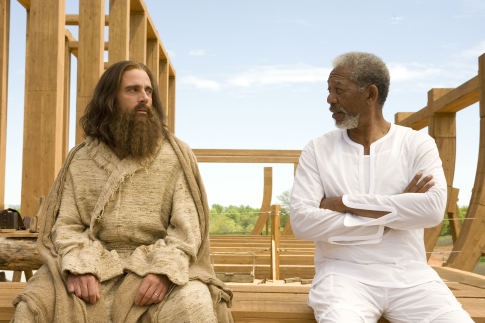Encouraging Kindness in Our Kids
“Evan Almighty” has been one of my family’s favorite movies for quite a while. If you’ve never seen this heartwarming family film about God (Morgan Freeman) choosing a modern day Noah named Evan Baxter (Steve Carell), you really should watch it. Through a wild adventure with God, his wife and three sons, congress, a ginormous pile of lumber, and a whole bunch of critters, Evan learns that God really does give each of us the power to change the world through a very simple process: one Act of Random Kindness (ARK) at a time. And I think the makers of this film really are onto something in the midst of their crazy tale. We really do have tremendous potential to change the world for the better, simply be practicing kindness every day with the people around us – wherever we live, work, or attend school.
In this spirit, I am offering you a sort of script you can use with your teens and preteens to open a meaningful conversation with them about the power of kindness. I presented this material recently to a school assembly of seventh and eighth graders, and they really received it. I hope it has already been a blessing to their school. And I hope this will be a blessing to your family, as well.
Kindness: the quality of being friendly, generous, and considerate.
The “Golden Rule” reminds us to treat others the way we want to be treated. Do you want to be treated with:
- Rudeness? or Kindness?
- Meanness? or Kindness?
- Arrogance? or Kindness?
- Coldness? or Kindness?
When you have an embarrassing moment, would you rather have people point out and laugh at your mistake…or reach out with encouragement and compassion? Would you rather have someone do something to rub it in and make it worse…or lend a hand to help you get through it? Which way do you respond to others in their moments of embarrassment? How do you think your response affects them?
Do you prefer spending time with people who are kind, thoughtful, considerate, generous, friendly, and encouraging? Or with people who are unkind, thoughtless, inconsiderate, selfish, rude, and discouraging? Think of an example of someone you know who represents each of these types of people. Who would you rather be more like? How can you practice being more like the positive person who came to your mind? What can you do to be a positive influence on the negative person who came to your mind?
If you were a new student in an unfamiliar school, which way would you want to be treated? Is that the way you have welcomed new students into your school (or youth group, etc)?
Do you think apologies are important? What difference do they make? How does it impact you when someone apologizes to you? How does it impact you when someone fails to apologize to you? Do you think it is ever too late for an apology? Why do you say that? Here is a great format for offering an apology that really makes a difference: “I’m sorry I ________. It must have made you feel ________, and I was wrong to do that to you. I’m really sorry. Please forgive me.” If you say or do something hurtful, mean, or teasing to another person, and then respond with some version of “I’m just kidding,” do you think that comment at the end really matters to that person? Does it really make it okay? Or is that just something we say to make ourselves feel better about acting like a jerk?
And finally, here is a simple tale about a boy whose father taught him a valuable life lesson about the power of our words and actions:
There once was a boy who had a bad temper. His father gave him a bag of nails and told him that every time he lost his temper, he must hammer a nail into the back of the fence. The first day, the boy had driven 37 nails into the fence. Over the next few weeks, as he learned to control his anger, the number of nails hammered daily gradually dwindled down. He discovered it was easier to hold his temper than to drive all those nails into the fence.
Finally, the day came when the boy didn’t lose his temper at all. He felt so proud as he shared this with his father, who suggested the boy now pull out one nail for each day he kept his temper in check. The days passed and the young man was finally able to tell his father that all the nails were gone.
The father took his son by the hand and led him out to the fence. He said, “You have done well, my son…but look at all those holes in the fence. The fence will never be the same. When you say things in anger, they leave a scar just like this one. You can put a knife in a man and draw it out. It won’t matter how many times you say ‘I’m sorry,’ because the wound is still there.”
It only takes a bit more effort to choose kindness, thoughtfulness, generosity, and encouragement over rudeness, thoughtlessness, selfishness, and discouragement. Choose wisely, and see how the world gets just a little better around you day by day as you water the soil of your neighbors with kindness.




0 Comments